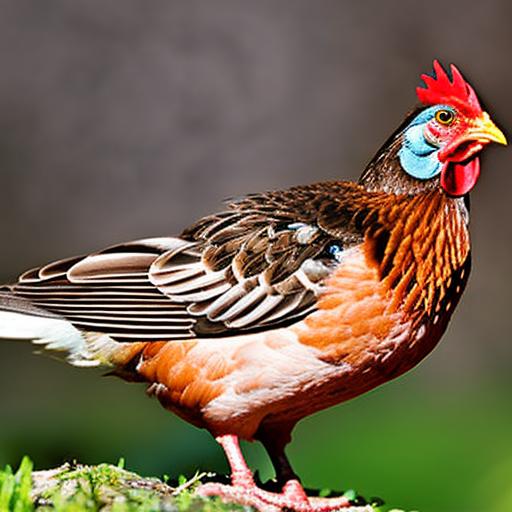Keeping chickens in urban areas has become increasingly popular in recent years. More and more people are realizing the benefits of having their own backyard flock, even in the midst of a bustling city. Urban chicken keeping allows individuals to have a sustainable source of fresh eggs, control pests naturally, and produce their own fertilizer. However, before embarking on this endeavor, it is important to understand the local laws and regulations regarding keeping chickens in the city.
Key Takeaways
- Understanding local laws and regulations is crucial for keeping chickens in the city
- Benefits of urban chicken keeping include fresh eggs, pest control, and composting
- Choosing a breed that is adaptable to small spaces and noise restrictions is important
- Building a secure coop with proper ventilation and waste management is essential
- Proper feeding, watering, and healthcare are necessary for the health of urban chickens
Understanding local laws and regulations for keeping chickens in the city
Before starting a backyard flock, it is crucial to research and understand the local laws and regulations regarding chicken keeping in your area. Each city or municipality may have different rules and restrictions, so it is important to be aware of them to avoid any legal issues or conflicts with neighbors.
Common regulations for urban chicken keeping include limits on the number of chickens allowed, requirements for coop size and placement, and restrictions on roosters due to noise concerns. Some cities may require permits or licenses for keeping chickens, while others may have specific zoning requirements. It is also important to check if there are any restrictions on slaughtering chickens or selling eggs.
Benefits of keeping chickens in urban areas
There are numerous benefits to keeping chickens in urban areas. One of the most obvious benefits is having a sustainable source of fresh eggs. Urban chicken keepers can enjoy eggs that are truly free-range and organic, knowing exactly what goes into their food.
Chickens also provide natural pest control by eating insects and other pests that may be present in the garden or yard. This can help reduce the need for chemical pesticides and promote a healthier environment.
Additionally, chickens produce high-quality fertilizer in the form of their droppings. This can be used to enrich the soil in gardens or compost piles, reducing the need for synthetic fertilizers.
Choosing the right breed of chicken for city living
When choosing a breed of chicken for urban living, it is important to select a breed that is well-suited for small spaces and close quarters. Some breeds are more adaptable to urban environments and can thrive in limited spaces.
Bantam breeds, such as Silkies or Polish, are popular choices for urban chicken keepers due to their small size and friendly temperament. They require less space and can be easily handled, making them suitable for families with children.
Other breeds that are well-suited for urban environments include the Rhode Island Red, Australorp, and Sussex. These breeds are known for their docile nature, adaptability, and ability to lay a good number of eggs.
Building a safe and secure chicken coop in a limited space
Building a chicken coop in a small backyard or urban space requires careful planning to ensure the safety and security of the chickens. It is important to provide adequate space for the chickens to move around, as well as protection from predators.
When designing a coop for limited space, consider using vertical space by incorporating multiple levels or using hanging roosts. This can maximize the use of space while still providing enough room for the chickens to move around comfortably.
It is also important to provide proper ventilation and insulation in the coop to regulate temperature and prevent moisture buildup. This can help prevent respiratory issues and other health problems in the chickens.
Feeding and caring for urban chickens

Feeding and caring for backyard chickens in an urban environment requires attention to their dietary needs and overall well-being. It is important to provide a balanced diet that includes a mix of commercial feed, kitchen scraps, and fresh greens.
Commercial chicken feed should make up the majority of their diet, as it contains all the necessary nutrients. However, supplementing their diet with kitchen scraps such as vegetable peels or leftover grains can provide additional nutrition.
Fresh greens are also important for their overall health. Chickens enjoy eating grass, weeds, and other leafy greens, so providing access to a small patch of grass or a portable chicken tractor can be beneficial.
Managing chicken waste and odors in a residential area
Proper management of chicken waste is essential for both the health of the chickens and the surrounding environment. Chicken manure is high in nitrogen and can be a valuable source of fertilizer, but it can also create odors and attract pests if not managed properly.
One way to manage chicken waste is by using a deep litter system in the coop. This involves adding a layer of bedding material, such as straw or wood shavings, and regularly turning it to promote decomposition. This helps control odors and provides a natural composting process.
Another option is to use a composting system specifically designed for chicken waste. This allows for the collection and composting of chicken manure separately from other compost materials, reducing odors and making it easier to manage.
Dealing with noise complaints from neighbors
Noise complaints from neighbors can be a common concern when keeping chickens in an urban area, especially if roosters are allowed. To address this issue, it is important to be a responsible and respectful chicken keeper.
If roosters are allowed in your area, consider keeping only hens to avoid noise issues. If you do have roosters, make sure their coop is soundproofed or located away from neighboring properties.
Additionally, provide plenty of enrichment for the chickens to keep them occupied and reduce excessive noise. This can include toys, perches, and access to fresh greens or treats.
Health and safety concerns for both chickens and humans in the city
There are several health and safety concerns that urban chicken keepers should be aware of for both the chickens and themselves. Chickens can be susceptible to various diseases and parasites, so it is important to practice good biosecurity measures.
Regularly inspect the chickens for signs of illness or injury, and consult a veterinarian if necessary. Keep the coop clean and dry to prevent the buildup of bacteria or mold that can cause respiratory issues.
For humans, it is important to practice good hygiene when handling chickens or their eggs. Wash hands thoroughly after handling chickens or their waste, and cook eggs thoroughly before consuming them to reduce the risk of salmonella.
Integrating chickens into a sustainable urban lifestyle
Backyard flocks can play a significant role in a sustainable urban lifestyle. Chickens provide a source of fresh eggs, reducing the need for store-bought eggs that may come from factory farms with questionable animal welfare practices.
In addition to eggs, chickens also produce high-quality fertilizer that can be used to enrich the soil in gardens or compost piles. This reduces the need for synthetic fertilizers and promotes a more sustainable approach to gardening.
Chickens can also be integrated into other sustainable practices, such as composting and gardening. Their waste can be added to compost piles to accelerate decomposition, and they can help control pests in the garden naturally.
Resources and support for urban chicken keepers
For those interested in keeping chickens in urban areas, there are numerous resources and support available. Local chicken keeping groups or clubs can provide valuable advice and support, as well as opportunities to connect with other urban chicken keepers.
Online forums and social media groups dedicated to urban chicken keeping are also great resources for information and support. These platforms allow individuals to ask questions, share experiences, and learn from others who have already embarked on their own backyard flock journey.
Keeping chickens in urban areas has become increasingly popular due to the numerous benefits they provide. However, it is important to understand and abide by local laws and regulations regarding chicken keeping. By choosing the right breed, building a safe coop, providing proper care, managing waste responsibly, and being respectful of neighbors, urban chicken keepers can enjoy the rewards of fresh eggs, natural pest control, and a more sustainable lifestyle.
If you’re considering keeping chickens in the city, you may be wondering how to provide them with a comfortable living environment. One important aspect to consider is keeping your chicken coop warm during colder months. Poultry Wizard offers a helpful article on choosing the right heater for your chicken coop, which can ensure your feathered friends stay cozy and healthy all year round. To learn more about this topic, check out their article on heater options for a chicken coop. Additionally, if you’re looking for inspiration on designing a functional and attractive chicken coop that fits well in your urban garden, Poultry Wizard also provides a great resource on creating a garden chicken coop.
FAQs
What are the benefits of keeping chickens in city limits?
Keeping chickens in city limits can provide a source of fresh eggs, natural pest control, and fertilizer for gardens. It can also be a fun and educational hobby for families.
Are there any laws or regulations regarding keeping chickens in city limits?
Yes, there are often laws and regulations regarding keeping chickens in city limits. These can vary by city and may include restrictions on the number of chickens allowed, coop size and placement, and noise levels.
What kind of space do chickens need?
Chickens need a coop for shelter and a run for exercise. The coop should be large enough for the number of chickens and provide protection from predators. The run should be fenced and provide at least 10 square feet per chicken.
What do chickens eat?
Chickens eat a variety of foods including commercial feed, grains, fruits, vegetables, and insects. It is important to provide a balanced diet for optimal health and egg production.
Do chickens make a lot of noise?
Chickens can make noise, especially when they are laying eggs or if they feel threatened. However, many breeds are relatively quiet and can be trained to be even quieter.
What are some common health issues for chickens?
Common health issues for chickens include respiratory infections, parasites, and egg-laying problems. Regular veterinary care and proper hygiene can help prevent and treat these issues.
Can chickens be kept in small yards?
Yes, chickens can be kept in small yards as long as they have enough space to move around and access to food, water, and shelter. However, it is important to check local regulations for minimum space requirements.
Meet Walter, the feathered-friend fanatic of Florida! Nestled in the sunshine state, Walter struts through life with his feathered companions, clucking his way to happiness. With a coop that’s fancier than a five-star hotel, he’s the Don Juan of the chicken world. When he’s not teaching his hens to do the cha-cha, you’ll find him in a heated debate with his prized rooster, Sir Clucks-a-Lot. Walter’s poultry passion is no yolk; he’s the sunny-side-up guy you never knew you needed in your flock of friends!







